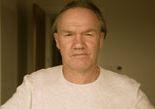Dr Tony Birch was born in inner-city Melbourne, into a large family of Aboriginal, West Indian and Irish descent. His upbringing was challenging and difficult, and much of this is captured in his remarkable debut, the semi-autobiographical Shadowboxing.
An altar boy and exceptional student at his local Catholic primary school, in adolescence, Birch went 'off the rails' as a teenager. He was expelled from two high schools for fighting and found trouble with the police for the same reason. Although somewhat adrift following his expulsions, he remained a voracious reader – once, when he was arrested by police, all they found when they patted him down was a copy of Camus’ The Outsider, which remains his favourite book.
Returning to night school to complete his studies, Birch met his mentor, Anne Misson, whose credo was very simple: 'You’ll be great, but only if you work your arse off.' Birch still lives by this and applies it to everything including his passion for running, which is where his writing is created and shaped.
Studying as a mature-age student at the University of Melbourne, Birch holds a Masters degree in Creative Writing, and, a PhD in History, which won the university's Chancellor's Prize for Excellence in 2013.
Birch has been publishing short stories and poetry regularly since the 1980s, although his first collection, Shadowboxing, only appeared in 2006. Since this, he has published four more collections of short stories and poetry (Father's Day [2009], The Promise [2014], Broken Teeth [2016], and Common People [2017] and two novels (Blood [2011] and Ghost River [2015]).
Among his awards are the Scanlon Prize and the Prize for Indigenous Writing (Victorian Premier's Literary Awards). He has also been shortlisted for the Christina Stead Prize for Fiction (NSW Premier's Literary Awards), the Steele Rudd Award (with both the original Queensland Premier's Literary Awards and the later Queensland Literary Awards), and the Miles Franklin Literary Award.
In 2015, he joined Victoria University as the first recipient of its Dr Bruce McGuinness Indigenous Research Fellowship. His role sits within the Moondani Balluk Academic Unit and is linked to the University’s creative arts and writing programs. He has also taught creative writing at the University of Melbourne for many years.
Birch’s work is widely read and loved including by those who might normally avoid books, particularly teenage boys. Through his outreach work, he visits many schools to speak to students, and takes particular pleasure in returning to the two schools that expelled him, as both of his previous books are on the syllabus.
In 2022, he was appointed as the third Boisbouvier Chair in Australian Literature at the University of Melbourne, following Richard Flanagan and Alexis Wright.



